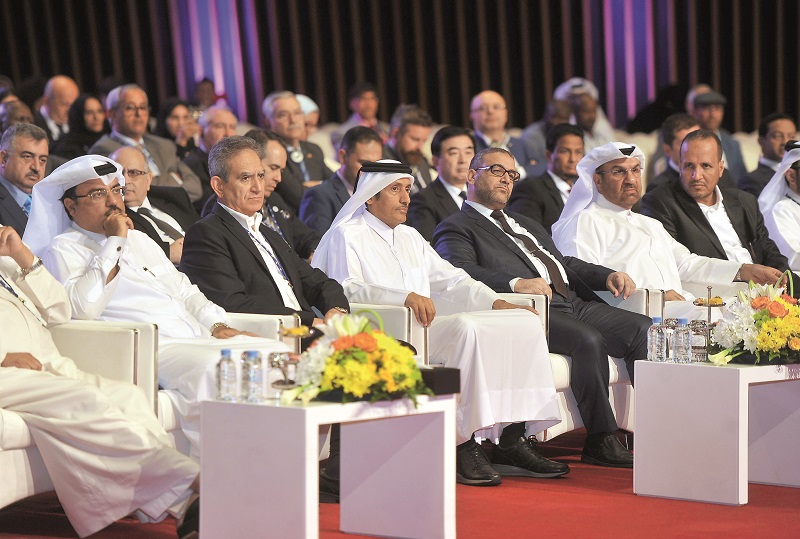
H E Sheikh Hamad bin Thamer Al Thani, Chairman of Qatar Media Corporation, and Chairman of Board of Directors of Al Jazeera Media Network, during the opening ceremony of Al Jazeera Forum yesterday. Pic: Abdul Basit / The Peninsula
Doha: H E Sheikh Hamad bin Thamer Al Thani, Chairman of Qatar Media Corporation (QMC), and Chairman of Board of Directors of Al Jazeera Media Network, has said that the Gulf crisis has threatened the security of Gulf Cooperation Council (GCC) states, their stability and prevented them from facing or resolving challenges in the region.
He said that due to ongoing Gulf crisis, the GCC states were not in a position to play an influential role in the region.
“Before this crisis, the Guf citizens aspired to see more GCC cooperation and many steps were planned like unification of the Gulf currency and passport. But the crisis shattered everything and damaged confidence among the GCC countries to the extent that the leaders of the GCC are no longer able to meet even,” said H E Sheikh Hamad bin Thamer Al Thani.
This came yesterday during the 13th Al Jazeera Forum which is being held at Sheraton Grand Doha Resort under the topic ‘The Gulf: From Crisis to Decline of Strategic Influence’, in the presence of a number of politicians, intellectuals and decision-makers from around the world to exchange views without tutelage.

H E Sheikh Hamad bin Thamer Al Thani (third left), Chairman of Qatar Media Corporation and Chairman of Board of Directors of Al Jazeera Media Network, with Khalid Mashri (third right), President of High Council of State in Libya; Dr Mostefa Souag (second left), Acting Director-General of Al Jazeera Media Network, and other officials during the opening ceremony of Al Jazeera Forum at Sheraton Doha yesterday. Pic: Abdul Basit / The Peninsula
“The GCC crisis is considered the biggest Gulf crisis despite various crises experienced by the region in the past. Its impact is no longer limited to the political and socio-economic impact but extends to the strategic dimension of the entire Gulf system,” he pointed out while addressing the opening session of the forum.
He also said that there is a fear among some countries of the region that siege-like situation could be repeated with them in the future, stressing that the siege countries did not achieve their goals but all were among sufferers from the crisis.
The President of the High State Council of Libya, Khalid Al Mishri, stressed that the problem of Gulf crisis is due to attempts of some countries to control other countries which do not agree with their policy.
“The GCC was considered by all Arabs as a model for major regional projects especially in the context of Gulf consensus that was non-existent in other Arab countries. The economic, social and geographical proximity was the biggest factor that augured the Council’s success,” he added.
Al Mishri mentioned that the Gulf states, which tried to control Qatar, were also trying to end the democratic experiment in Libya and the rest of the Arab countries. “They stand against revolutions and even provoke wars with their proxies.” For his part, the member of Grand National Assembly of Turkey and former deputy chairman of Justice and Development Party, Mehdi Akkar, said in his speech that the situation where the GCC countries had reached was highly complicated in light of the crisis that undermined the security and stability of the region.
In the first session of the Forum that was held on theme ‘The Gulf relations’, the speakers noted that the Gulf crisis could continue longer as there were no positive signs from the siege countries and Doha had also rejected the ‘list of demands’ presented by the blockading states.




